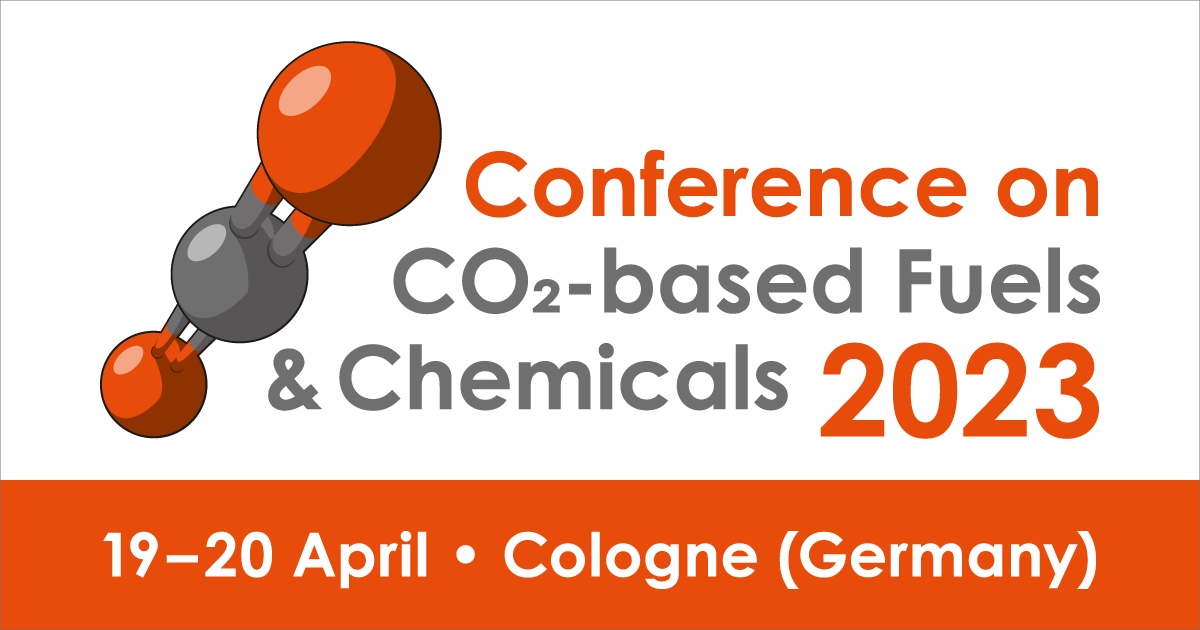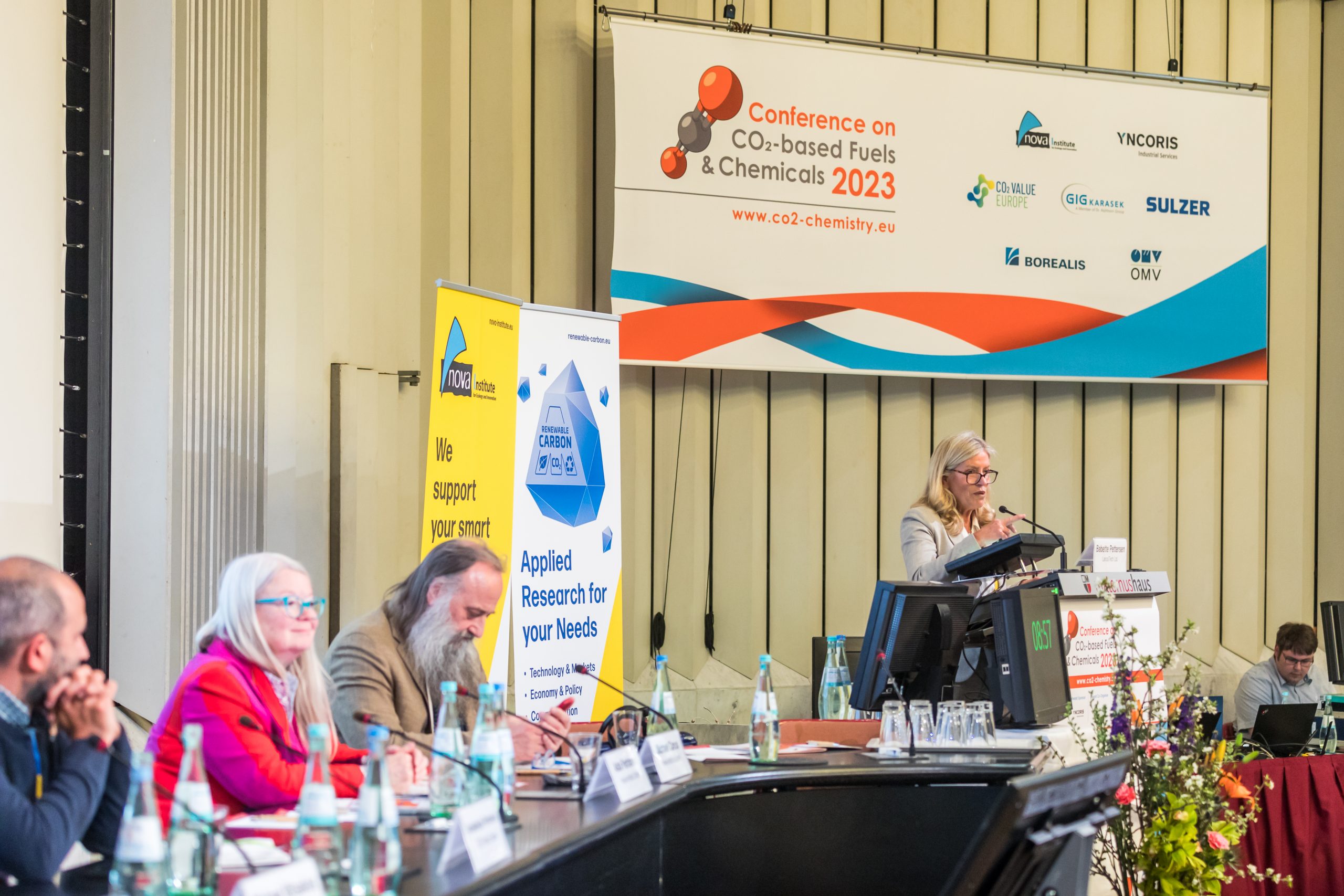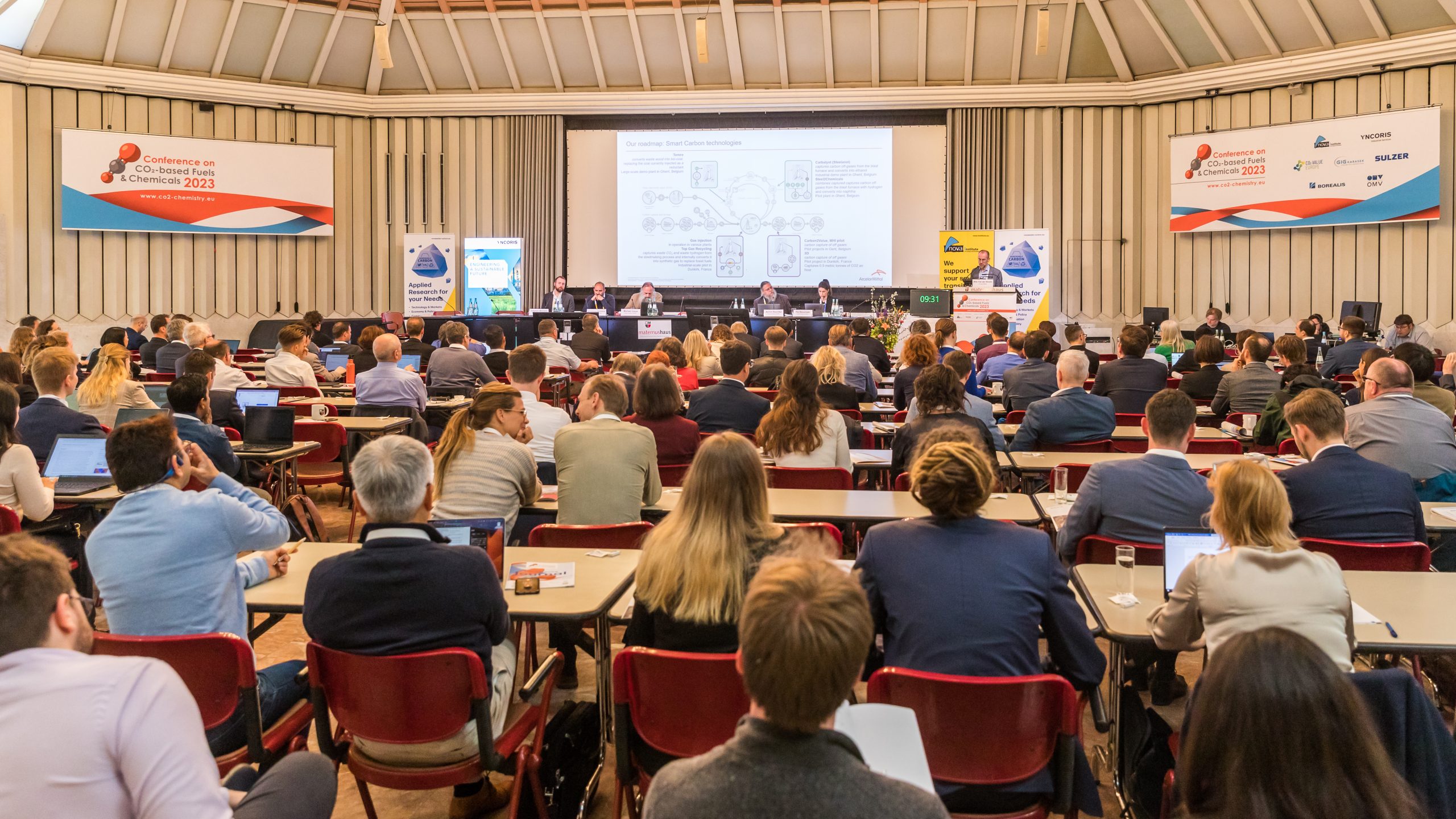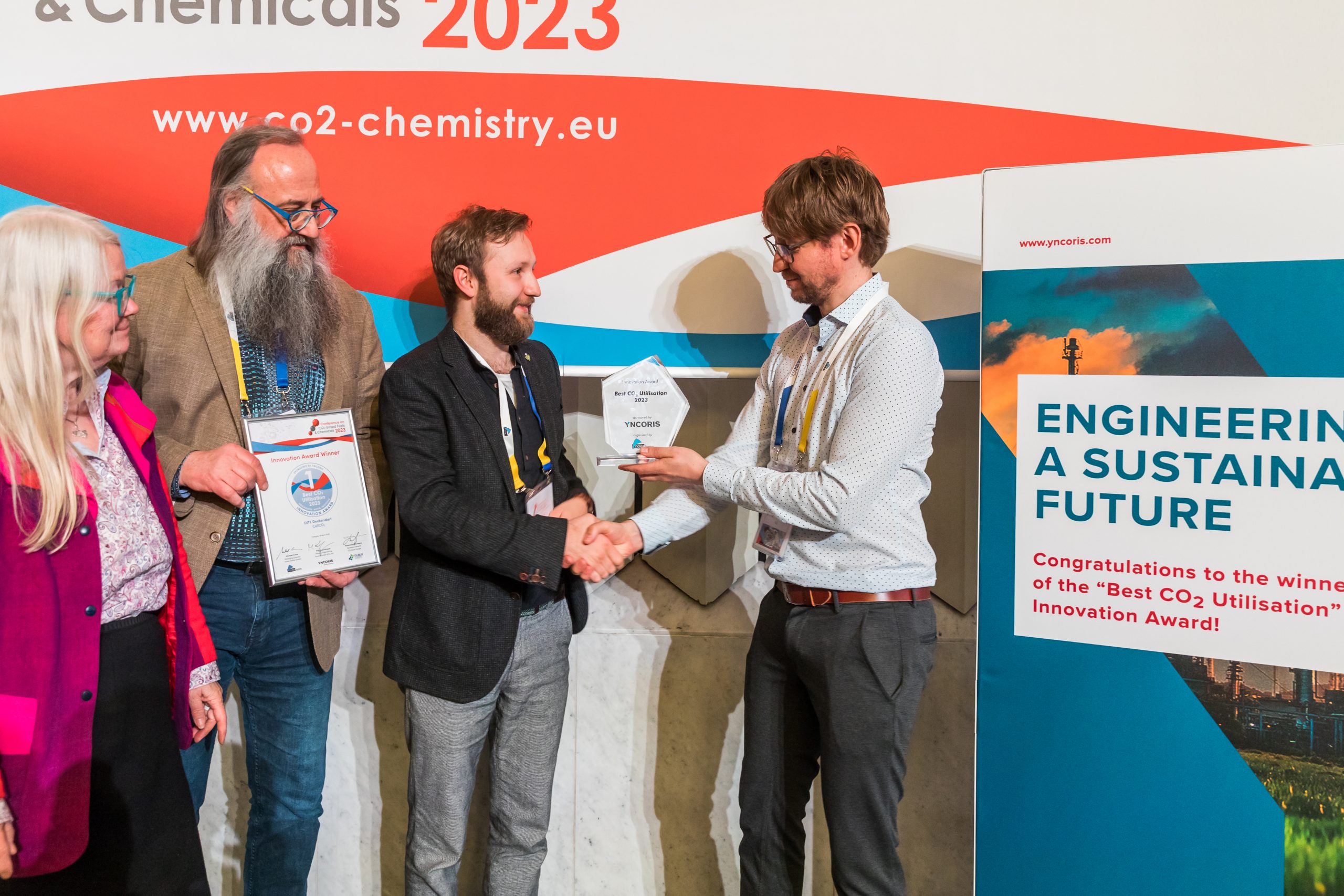
Innovative technologies and materials are crucial to meet the increasing demand for fossil-free carbon, e.g. derived from CO₂ or biomass, especially in the chemical and fuel sector. At this year’s Conference on CO2-based Fuels and Chemicals (www.co2-chemistry.eu) 245 participants from 30 countries across the world explored the latest innovations and trends in CCU and Power-to-X technologies and enjoyed the presentations of over 40 experts from industry, research and associations. The event took place from 18–19 April 2023 in Cologne, Germany, and online and has established itself as a unique event for related industries and their customers.
A new report by nova-Institute on the use of CO₂ for chemicals, advanced fuels, polymers, proteins and minerals, that attracted high interest at the conference, estimates the production capacity of CO2-based products to grow from currently 1.3 Mt/a to at least 6 Mt/a by 2030 (Ruiz et al. 2023). The report is a unique testament of the progress of CO2utilisation, its expected high growth in the following years, but also its relevance for various industries.

Clear Need for Supportive Policy Frameworks
The European Taxonomy Regulation (EU) declared the use of environmentally safe CCU technologies as eligible “sustainable” economic activities. Although several activities like the ReFuel EU Aviation and Fuel EU Maritime Europe, the Net Zero Industry Act and Renewable Energy Directive (REDIII) have set positive impulses, Europe still lacks a supportive political framework that can foster investment in CCU technologies and the positive consideration of CO₂ as feedstock. In contrast, countries like China and especially the USA, with its Inflation Reduction Act, that supports the use of CO2 for fuels and chemicals from air capture and point sources, including commercial plants, already established supportive policies, resulting in notably increased research and industrial activity (de la Garza 2022). Michael Carus, CEO at nova-Institute, emphasizes that CCU is much more than a carbon removal technology and is needed to provide renewable carbon as a feedstock for various industries.
Still, different associations are pushing for progress in CCU and Power-to-X policy. Anastasios Perimenis, secretary general of co-organizer CO2 Value Europe, presented the association’s work on a European Roadmap for CCU based on different scenarios. The clear message: a supportive regulatory framework is the key for the successful implementation of CCU technologies on a higher scale. Wim van der Stricht from the steel-producing company ArcelorMittal (DE) and Babette Pettersen from LanzaTech (US), a forerunner in the area of offgas-fermentation for ethanol production, confirmed this statement from an industrial perspective. Both companies joined forces to build a pilot plant for ethanol production in Ghent, Belgium, named Steelanol.

Run on Methanol and Other (E-)Fuels
While CO2 conversion and Power-to-X solutions offer a broad range of applications, reaching from minerals, polymers, chemicals, materials, to green hydrogen and many other added value products, strong attention is currently set on the hydrogenation of CO2 to methanol. Due to its easy to obtain and highly efficient nature, methanol is gaining increasing importance as a fuel in the transport sector and as a chemical building block. This was proven by numerous presentations.
Emeric Sarron from the Iceland-based company Carbon Recycling International (CRI) offered insights on worldwide activities in methanol production for fuels and chemicals. In October 2022, the world’s first commercial scale CO2-to-methanol plant using CRI’s technology started production in Anyang, China. The plant captures and converts 160,000 tonnes of carbon dioxide and produces 110,000 tonnes of methanol per year, with expected capacity increase in the future.
Norwegian company Nordic Electrofuel (NO) also introduced its plans to build a demonstration plant for the production of e-fuels for aviation in Norway, while CEO Nicholas Flanders of the US-based company twelve (US) announced a planned scaling up of electrochemically produced CO and syngas for Fischer-Tropsch-based chemistry and fuels in California. Another project by RWE (DE) focuses on enhancing hydrogen production as an enabler for CCU, while IFPEN (FR) plans to optimise e-fuel production, and Econic Technologies (UK) is working on the production of CO2-containing polyols.
CO2 Absorber Material CellCO2 Wins “Best CO2 Utilisation 2023” Innovation Award
One of the event highlights was the innovation award “Best CO2 Utilisation 2023” which celebrated six pioneering CCU innovations. This year`s award was granted to CellCO2, an outstanding solution developed by the German Institutes of Textile and Fiber Research (DITF). This CO2 absorber material is based on the conversion of cellulosic fibres into non-woven, whose surface then is chemically modified with amines. Non-woven provide a large specific surface area enabling it to bind the largest possible volumes of CO2. By successfully combining bio-based carbon sources and CCU, CellCO2 successfully manages to incorporate two of the three pathways to renewable carbon solutions (www.ditf.de).
The Austrian company Arkeon was awarded the second prize for its innovative technology leveraging archaea microorganisms that naturally produce all the building blocks of proteins in only one fermentation. The process converts CO2 directly into amino acids and functional peptides, making it suitable for the use in various food products (www.arkeon.bio).
Ultra-low Carbon Concrete by the US company CarbonBuilt won the third prize for its visionary carbon utilisation technology, which replaces cement with a proprietary mix of low-cost, low-carbon industrial waste materials, and thus reduces the embodied carbon of concrete by 70–100% (www.carbonbuilt.com).
Anastasios Perimenis, secretary general of co-organizer CO2 Value Europe, states: “This year’s award winners showcased how Carbon Capture and Unitilisation (CCU) can have a tangible and positive impact in our everyday life. Whether it is to improve capture, to produce proteins from CO2, or to provide alternative building products, CO2 is becoming a commodity and helping us defossilise our economy. CO2 Value Europe was, also this year, a proud co-organiser of the award and is supporting all actors of the CCU community to showcase their solutions, create collaborations and show that CCU significantly contributes in reaching EU’s climate and circularity goals .”

Sponsors and partners
The Innovation Award “Best CO2 Utilisation 2023” was sponsored by YNCORIS, a service partner for the future-proof chemical industry, and is organised by nova-Institute and CO2 Value Europe, the international association representing the CCU community in Europe and beyond.
This edition of the Conference on CO2-based Fuels and Chemicals 2023 was supported by numerous industry and trade associations, non-profit organisations, research institutions and interest groups, that are thematically linked to the conference: BBE – Bundesverband Bioenergie (DE), BCNP Consultants (DE), BIG C -BioInnovation Growth Mega-Cluster (EU), C.A.R.M.E.N. (DE), CLIB – Cluster Industrial Biotechnology (DE), Global CO2 Initiative (International), IBB – Industrielle Biotechnologie Bayern Netzwerk (DE), IN4climate.NRW (DE), kunststoffland NRW (DE), Plastics Europe (DE), Renewable Carbon Initiative (International), VoltaChem (NL) and Premium Partner CO2Value Europe (Co-organiser Innovation Award).
Borealis, GIG Karasek, OMV and Sulzer were supporting the event as sponsors.
References
De la Garza, A. 2023: The Inflation Reduction Act Includes a Bonanza for the Carbon Capture Industry (www.time.com). Last access 23-03-01. https://time.com/6205570/inflation-reduction-act-carbon-capture/
Pauline Ruiz, Pia Skoczinski, Achim Raschka, Nicolas Hark, Michael Carus. With the support of: Aylin Özgen, Jasper Kern, Nico Plum (all nova-Institute): Carbon Dioxide (CO₂) as Feedstock for Chemicals, Advanced Fuels, Polymers, Proteins and Minerals https://renewable-carbon.eu/publications/product/carbon-dioxide-co2-as-feedstock-for-chemicals-advanced-fuels-polymers-proteins-and-minerals-pdf/
About nova-Institute
Internet www.nova-institute.eu – services at www.renewable-carbon.eunova-Institute is a private and independent research institute, founded in 1994; nova offers research and consultancy with a focus on the transition of the chemical and material industry to renewable carbon: How to substitute fossil carbon with biomass, direct CO2 utilisation and recycling. We offer our unique understanding to support the transition of your business into a climate neutral future.
Source
nova-Institute, press release, 2023-05-02.
Supplier
ArcelorMittal
Arkeon Biotechnologies
BCNP Consultants
BIG-Cluster BioInnovation Growth mega-Cluster
Borealis Polyolefine AG
Bundesverband BioEnergie e.V. (BBE)
C.A.R.M.E.N. e.V.
Carbon Recycling International (CRI)
CarbonBuilt
Cluster Industrielle Biotechnologie e.V. (CLIB2021)
CO2 Value Europe
DITF – Deutsche Institute für Textil- und Faserforschung Denkendorf
Econic Technologies Ltd.
GIG Karasek GmbH
IFP Energies nouvelles (IFPEN)
IN4climate.NRW
Industrielle Biotechnologie Bayern Netzwerk GmbH (IBB Netzwerk GmbH)
kunststoffland NRW e.V.
LanzaTech Ltd.
Nordic Electrofuel
nova-Institut GmbH
OMV AG
Plastics Europe
Renewable Carbon Initiative (RCI)
RWE AG
Sulzer Chemtech Ltd.
The Global CO2 Initiative
Twelve (formerly OPUS12)
VoltaChem
YNCORIS
Share
Renewable Carbon News – Daily Newsletter
Subscribe to our daily email newsletter – the world's leading newsletter on renewable materials and chemicals










